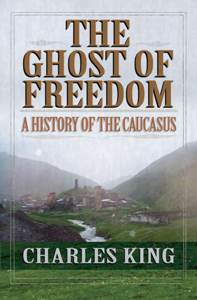6 February 2013
Book review: The Ghost of Freedom by Charles King
 The Ghost of Freedom — A History of the Caucasus
The Ghost of Freedom — A History of the Caucasus
Charles King
Oxford University Press, New York
January 2008
314 pages
ISBN: 978-0-19-517775-6
The Ghost of Freedom is not really a history of the Caucasus, but rather a history of the Caucasus and Russia's involvement therein since 1800. Moreover, much of the events until the end of the 19th century are described from the Russian perspective.
King's ambition to provide a general overview of the region invites comparison to Let Our Fame be Great by Oliver Bullough and The Caucasus by Thomas de Waal, both published since and recently reviewed here. Luckily (since all three books are well worth reading), the books turn out to be largely complementary — all three cover events not found in the other books. And while Let Our Fame be Great treats the North Caucasus and The Caucasus the South, The Ghost of Freedom is devoted to both parts.
There is not much else to say about The Ghost of Freedom other than the fact that it is a good book. The best way to illustrate its contents is to list some of the most interesting issues and topics that King touches upon:
- The military logic of the Caucasus wars, in particular life along Russia's fortified lines in the North Caucasus.
- The case of Polish soldiers who were sent to the Caucasus as punishment for rising up against the Russian state and who would often desert, either into the mountains or to the Ottoman Empire.
- Ottoman slavery, in particular how it differed from American slavery, and how it could be preferable to Russian servitude.
- The appearance of 'Circassian' women in American freak shows.
- The disappearance of the climbing party of W.F. Donkin, Harry Fox and two Swiss guides on the slope of Mount Koshtan, and the subsequent mission sent out to uncover their fate.
- The coming about of the first detailed accounts of the Caucasus written by Johann Anton Güldenstädt, Julius Heinrich Klaproth and Semyon Bronevsky.
- The different rises of nationalism in Georgia, Armenia and Azerbaijan.
- The Armenian genocide and contemporaneous massacres of Turks.
- The first Armenian, Georgian and Azerbaijani republics that existed between 1918 and 1921.
- The fate of Caucasian leaders in exile after the Soviet takeover and militancy in the Armenian diaspora.
- Soviet nationalities policy.
- The GAI (State Auto Inspectorate) in the (former) Soviet Union.
- The development of art, literature and scholarship in the Soviet Union.
- The outbreak of conflicts when the Soviet Union unravelled, including the observations that the international community tolerated one kind of secessionism but not another, and that the decisive factor in the outbreak of war was the fact that unlike the Soviet government, elites on the republican level used force against regional claims to sovereignty.
Perhaps the most important quality of The Ghost of Freedom is the sound judgement King demonstrates in the many controversial issues that pass along. A rare mistake is the suggestion that it was Meliton Kantaria who first planted a Soviet flag on Berlin's Reichstag (this honour probably belongs to Mikhail Minin) and that a spontaneous photo was taken (it was staged). Lastly, while its dramatic language may appeal more to some than to others, The Ghost of Freedom is also well written.